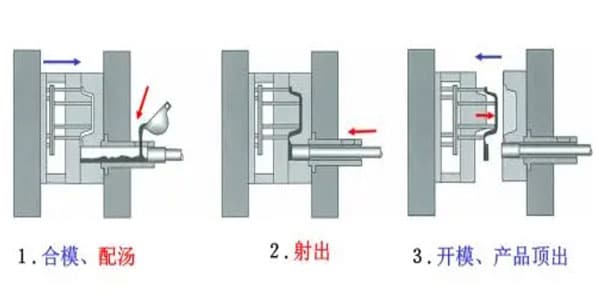An Unbiased View of Alcast Company
An Unbiased View of Alcast Company
Blog Article
What Does Alcast Company Do?
Table of ContentsThe Definitive Guide to Alcast CompanyGet This Report about Alcast CompanyThe Best Strategy To Use For Alcast CompanyAlcast Company Things To Know Before You BuyRumored Buzz on Alcast CompanyWhat Does Alcast Company Do?
The refined distinction hinges on the chemical content. Chemical Comparison of Cast Aluminum Alloys Silicon promotes castability by lowering the alloy's melting temperature and boosting fluidness during spreading. It plays a critical function in enabling elaborate molds to be filled accurately. Furthermore, silicon adds to the alloy's stamina and use resistance, making it important in applications where longevity is important, such as vehicle parts and engine components.It additionally enhances the machinability of the alloy, making it simpler to refine into finished items. In this means, iron adds to the general workability of light weight aluminum alloys.
Manganese adds to the strength of light weight aluminum alloys and enhances workability (aluminum metal casting). It is typically made use of in wrought light weight aluminum items like sheets, extrusions, and accounts. The visibility of manganese aids in the alloy's formability and resistance to cracking throughout fabrication procedures. Magnesium is a lightweight element that offers stamina and influence resistance to light weight aluminum alloys.
How Alcast Company can Save You Time, Stress, and Money.
It enables the production of lightweight components with exceptional mechanical homes. Zinc improves the castability of light weight aluminum alloys and assists control the solidification process throughout spreading. It improves the alloy's stamina and firmness. It is usually found in applications where intricate shapes and great details are necessary, such as attractive spreadings and particular automotive components.

The primary thermal conductivity, tensile stamina, return strength, and elongation differ. Select suitable raw products according to the performance of the target product created. Amongst the above alloys, A356 has the highest possible thermal conductivity, and A380 and ADC12 have the most affordable. The tensile limitation is the opposite. A360 has the most effective yield stamina and the highest possible prolongation price.
The Of Alcast Company

In accuracy spreading, 6063 is well-suited for applications where elaborate geometries and top quality surface area coatings are extremely important. Examples include telecommunication units, where the alloy's superior formability enables sleek and aesthetically pleasing designs while preserving architectural integrity. In the Lighting Solutions sector, precision-cast 6063 parts develop elegant and reliable lighting fixtures that call for intricate shapes and good thermal efficiency.
It leads to a finer surface finish and much better deterioration resistance in A360. Additionally, the A360 displays premium elongation, making it perfect for complex and thin-walled parts. In precision casting applications, A360 is appropriate for industries such as Consumer Electronics, Telecommunication, and Power Tools. Its improved fluidness enables for complex, high-precision components like smart device housings and interaction tool housings.
The 8-Minute Rule for Alcast Company
Its special residential properties make A360 an important selection for accuracy casting in these markets, boosting product longevity and quality. aluminum casting manufacturer. Aluminum alloy 380, or A380, is a commonly used casting alloy with a number of distinct attributes.
In precision casting, light weight aluminum 413 beams in the Customer Electronic Devices and Power Equipment markets. It's commonly utilized important source to craft detailed components like smart device real estates, electronic camera bodies, and power device housings. Its precision is remarkable, with tight resistances as much as 0.01 mm, ensuring flawless product assembly. This alloy's remarkable rust resistance makes it an excellent option for outside applications, guaranteeing resilient, durable products in the pointed out markets.
Alcast Company - An Overview
Once you have decided that the light weight aluminum die casting process is ideal for your task, an important following step is choosing the most proper alloy. The light weight aluminum alloy you choose will significantly affect both the spreading process and the properties of the end product. As a result of this, you must make your choice meticulously and take an educated strategy.
Figuring out the most suitable aluminum alloy for your application will imply evaluating a large range of qualities. The initial group addresses alloy attributes that impact the manufacturing procedure.
Alcast Company Fundamentals Explained
The alloy you select for die spreading directly influences numerous elements of the casting process, like just how simple the alloy is to collaborate with and if it is prone to casting issues. Hot breaking, additionally referred to as solidification fracturing, is a normal die spreading problem for aluminum alloys that can cause internal or surface-level rips or splits.
Particular light weight aluminum alloys are a lot more prone to hot breaking than others, and your selection should consider this. Another common defect found in the die casting of aluminum is die soldering, which is when the actors adheres to the die walls and makes ejection hard. It can harm both the cast and the die, so you need to try to find alloys with high anti-soldering residential or commercial properties.
Corrosion resistance, which is currently a remarkable quality of aluminum, can differ significantly from alloy to alloy and is an important characteristic to think about relying on the ecological problems your product will be revealed to (Casting Foundry). Use resistance is one more residential or commercial property commonly looked for in aluminum items and can set apart some alloys
Report this page